Читать книгу The New Irish Constitution: An Exposition and Some Arguments - Various - Страница 15
На сайте Литреса книга снята с продажи.
Scottish Home Rule
ОглавлениеTable of Contents
At the present moment we have in the case of Scotland devolution in a state of arrested development. This process of disintegration is reflected in separate Estimates in finance and in distinct draftsmanship in [pg 048] legislation. In legislation, indeed, marked changes have also taken place under cover of alterations in the Standing Orders of the House of Commons. An itinerant delegation of Scotch members has been set up to deal with private bill procedure in Scotland, and domestic devolution within the walls of the House of Commons has taken the shape of a Scotch Grand Committee. Few or none of these changes have any preconceived relation with the others; they represent experiments framed to meet the exigencies of the moment, but they all bear eloquent witness to a fact which has changed the whole aspect of the Home Rule problem and made that aspect at once more practical and less intimidating—the fact that the House of Commons has found itself increasingly incompetent to do its work. The fact is disguised by a multitude of expedients, all of them, however, amounting to a renunciation of legislative authority. These changes represent the disjecta membra of Scottish Home Rule—they have no coherence, they point not so much to a solution of the problem as to its recognition.
None the less, I think the Irish Government Bill does provide us with a prototype. There is nothing in it, with the exception of the financial clauses, which forbids its adoption in the case of Scotland and of England. But I think, as I have already indicated in another connection, that the category of reserved subjects ought to be considerably enlarged so as to secure the maintenance of the existing uniformity of legislation in commercial and industrial matters. There are, however, undeniable difficulties in the way of an identity of local constitutions. Legislation in regard to land is exempted from the control of the Irish Legislature to an extent which Scotland would hardly be prepared to accept. Control over legislation [pg 049] relating to marriage is retained in the case of Ireland; I doubt if it would be tolerated in Scotland, whose marriage law differs61 from that of England to a far greater extent than is the case with the marriage law of Ireland. In common law England and Ireland have the same rules;62 it is only in statute law that they differ. In Scotland the common law is radically different. There will, therefore, be some difficulty in finding a common denominator for the Imperial Parliament—and in avoiding, even under “Home Rule All Round” a certain divergence in the legislative capacities of the members from Scotland and Ireland, with the attendant risk of an “in-and-out” procedure.
